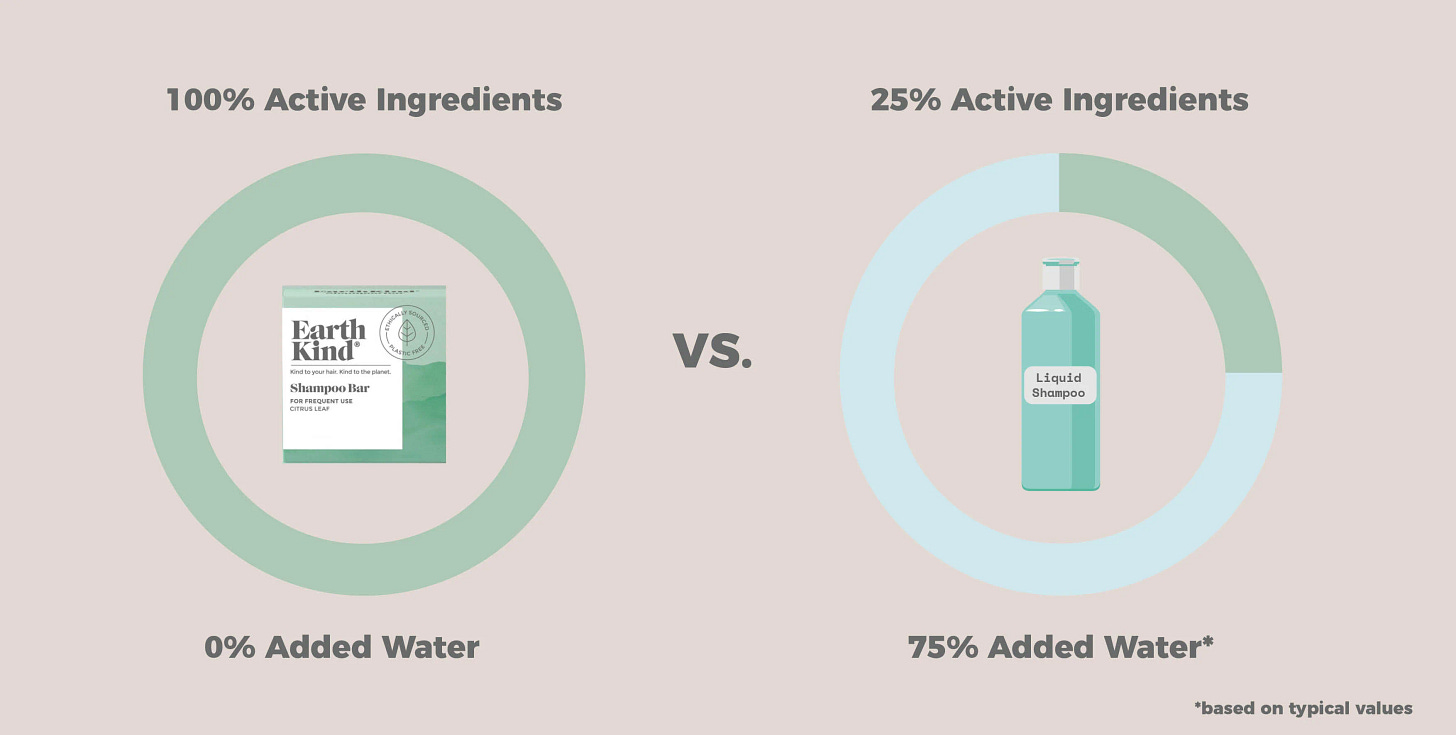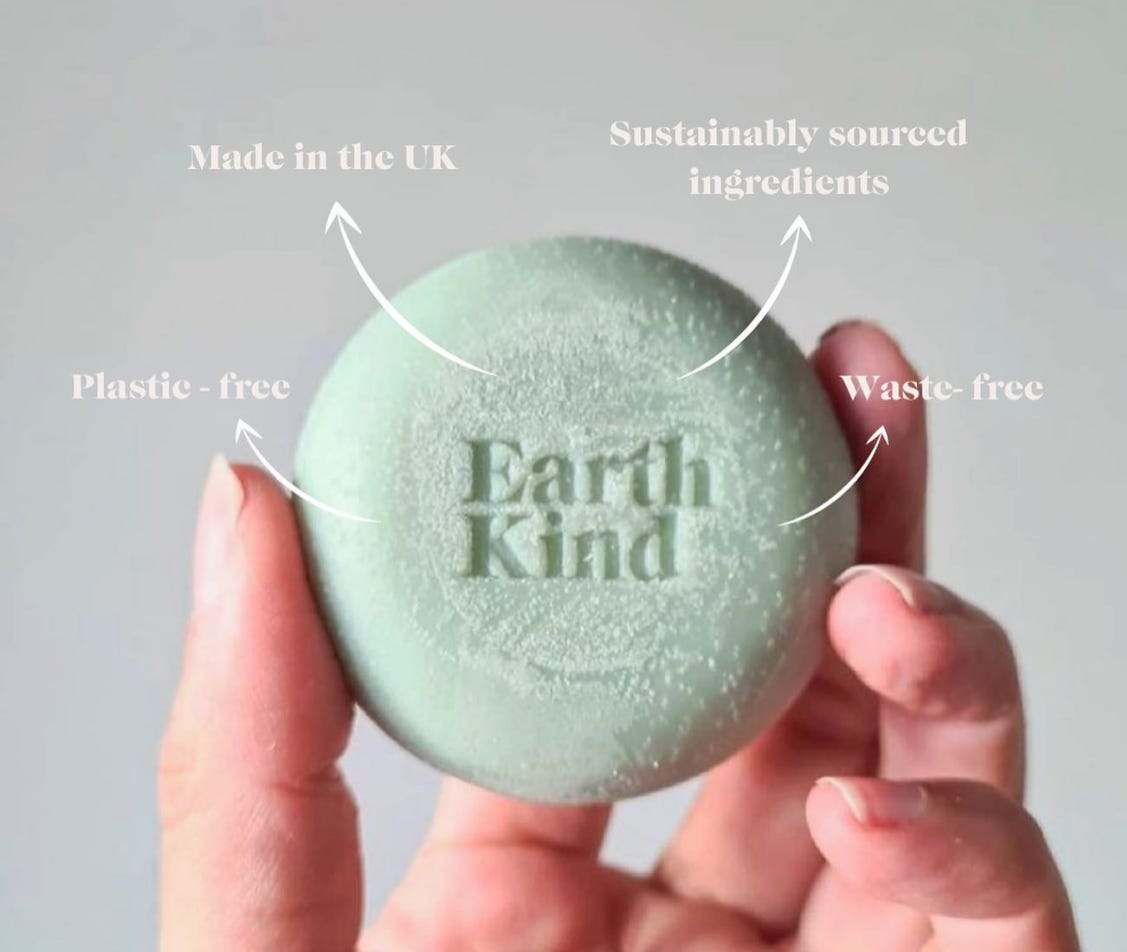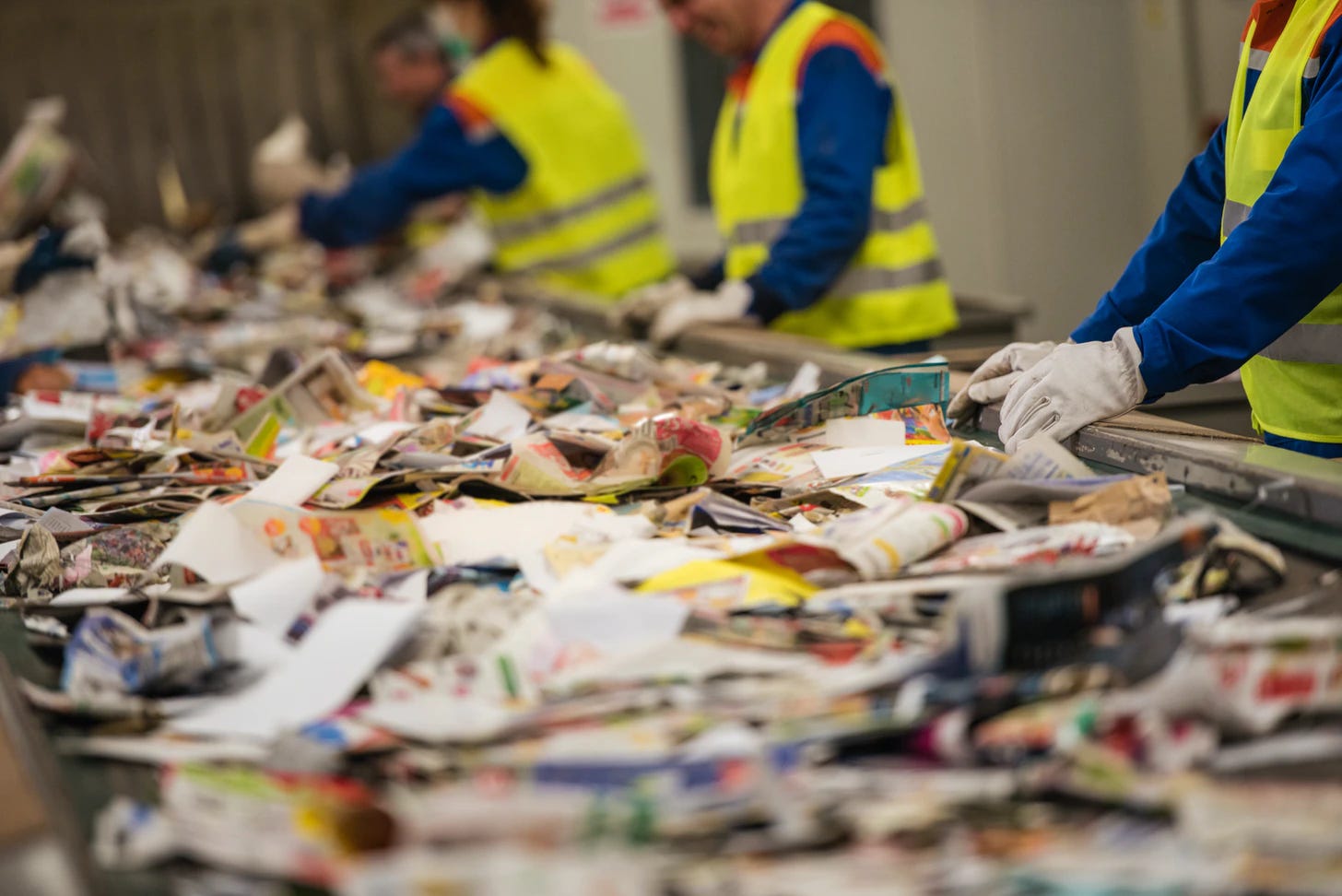🌱 Plastic Free July: 5 partners for your first steps, and EarthKind's 2 part strategy to take bottles out the bathroom.
Featuring EarthKind, Grubby, Karma Drinks and more...
Happy Monday!
This week we cover:
Plastic Free July: How brands can get involved, and 5 partners to help you take your first steps.
A little lather goes a long way: EarthKind’s 2 part strategy to take the plastic bottles out of the bathroom.
In case you missed it: Plastic Accounting 101: How Your Brand Can Take Action, by Noah Godfrey.
Before we dig in, we’d love to ask you a quick question: Which part of this newsletter do you find most useful? Please click on your answer:
Thank you for participating - please only answer this question once.
> Good News Last Week
🎯 Plant-based meal kit Grubby became the first UK recipe kit to show carbon footprints for 100% of their range, with over 100 recipes. They worked with My Emissions to achieve this.
🎯 The Saffron ice Cream Company launched the UK’s first vegan ice cream using DUG’s potato milk.
🎯 Symbrosia raised $7 million in funding through Danone Manifesto Ventures. The start-up’s natural seaweed feed reduces livestock methane emissions or “cow burps” through chemically reducing the naturally occurring methane during a cow’s digestion process.
🎯 Jude’s collaborated with Dawson Group to install the UK’s first mobile solar powered cold-store at their site in Twyford. The cold-store measures 54m2 contributes to their commitment to reduce carbon intensity by 43% by 2030.
⭐️ Lidl launched their ‘Good to Give’ label to direct shoppers to products needed by food banks. The label aims to diversify and increase donations and ensure that healthy products are donated.
⭐️ Nestle ranked #1 in Tortoise Media’s Better Food Index, looking at the social, environmental and economic performance of the UK’s largest food companies.
⭐️ Amazon announced they will no longer use plastic air pillows within delivery packaging. Instead they will use dunnage, 100% recycled and recyclable packaging paper for single-use packaging of deliveries from third-party brands.
⚡️ The Consumer Goods Forum launched the Carbon Solutions Hub, in collaboration with Accenture, to help FMCG businesses on their pathway to Net Zero.
> Click on each link to read more.
> Quick Take
Plastic Free July: How brands can get involved, and 5 partners to help you take your first steps.
First launched in 2011, Plastic Free July is the brainchild of Plastic Free Foundation co-founder Rebecca Prince-Ruiz. Since then, it has grown exponentially, engaging hundreds of millions of people since 2020. The initiative is simple: to remind people about the catastrophic environmental impact of plastic, but more importantly to provide ideas and practical resources to reduce single-use plastic at an everyday level. Now, it’s the perfect opportunity for brands to not just reduce their own impact, but connect with millions of like-minded customers and encourage them to do the same.
How to step up to the challenge:
Plastic Free July has done a great job of keeping things simple but effective. Their hub for businesses provides genuinely actionable ideas and doable steps to help brands of any size reduce their impact. They even say it themselves:
“Plastic Free July provides a platform for business to make positive changes and to connect those plastic free choices with the values and aspirations of staff and customers.”
We’ve picked out three key avenues your brand should explore:
1. Engaging staff and customers
This mini-resource hub provides the tools to help businesses engage and inspire their customers and partners. Alongside tips and tricks, they’ve created free, downloadable signage; a simple but effective way of letting customers and staff know that your brand wants to be part of the change. Educate your customers and tag @plasticfreejuly, organise film screenings for your colleagues, get creative about how to communicate the plastic waste problem this month.
2. Packaging
When it comes to consumer goods businesses, plastic in packaging is all too common. The site’s handy how-to offers often overlooked solutions that make a big difference, such as a bin audit and a procurement card to help you reconsider your supply chain policies.
3. Food service
Perfect for the food and drinks industry, this is a simple, accessible guide for the hows, the whys and the what-nexts. With the plastic-free conversation often feeling overwhelming, Plastic Free July are keen to celebrate even the smallest steps
Going 100% plastic-free is undoubtedly a tough ask for consumer goods brands. The key message here is not that it’s all-or-nothing. If you can’t entirely eradicate plastic from your supply chain, can’t make it to that 100%, even reducing your use by 50%, 25%, 10%, is 100% worth doing. If your brand isn’t ready to walk the full walk, then it’s still a great time to take your first steps.
Ready to dip your toes in? Here are our top picks for partners to help you on your way:
Ampliphi is an online plastic management and accounting platform to help you measure and mitigate plastic waste. Interested? Dig into our article by Ampliphi co-founder Noah Godfrey on Plastic Accounting 101.
CleanHub removes plastic waste from the oceans for every sale. See how Yamo made it work for them.
The Flexible Plastics Fund provide incentives for facilitating a circular packaging system, favourited by Karma Drinks.
ReFactory work with brands such as Boots to recycle problem materials, with plastics a speciality.
ClubZero provide plastic-alternative, reusable containers for the food and drinks industry, attracting big-hitters Starbucks and small local cafes.
> Brand Spotlight
A little lather goes a long way: EarthKind’s 2 part strategy to take the plastic bottles out of the bathroom.
The facts about plastic aren’t pretty. The UK government estimates that ~5 million tonnes of plastic are used every year, and over half of this is packaging. Provisional UK Government statistics for 2021 state that only 44.2% of this actually gets recycled, a decrease from previous years. WWF estimates that only 31% of plastic waste is recycled, yet WRAP reveals slightly more positive upwards trends with a 4% rise in plastic collection between 2017/18 - 2021. To kick off Plastic Free July, we want to profile a brand on a mission to remove plastic waste from our bathrooms: a notoriously difficult challenge (do you even have a recycling bin in there?).
Enter EarthKind. Founded by Trichologist Tony Maleedy, and voted Best Buy 2021 at the Green Parent Natural Beauty Awards, EarthKind are taking the bottles out of the bathroom. Sold in Sainsbury’s, Ocado, Holland & Barrett and more, it’s clearly catching on - and it needs to. A 2020 study suggested that the UK throws away 520 million (on average) shampoo bottles every year. So, EarthKind are tacking the problem at source - by getting rid of the bottles to begin with.
Specialising in shampoo and conditioner bars, their strategy is two-fold:
Dry ingredients = no plastic needed. Their FSC certified mix-board packaging is easier to recycle, and causes less consumer confusion around doing so. Their products are also smaller, compared to liquid shampoos that contain 75% water (according to EarthKind), so they’re using less resources for packaging full stop.
Lighter products = lower emissions. Decreasing their weight by removing water as an ingredient, but still providing their customers with comparable uses as a competitor’s product, reduces potential emissions in the transportation phase. No heavy bottles, glass cases, and ultimately transported water.
Developed outside of Bath (there’s a pun there, somewhere) and manufactured in the UK, each 50g EarthKind Shampoo Bar is equivalent to two 250ml plastic bottles of regular liquid shampoo. Their ingredients are ethically sourced and fully natural, focusing on active ingredients for the best results. So, for EarthKind customers, a little lather goes a long way.
Interested? Read more about EarthKind here.
Support EarthKind via their shop:
> In case you missed it
Plastic Accounting 101: How Your Brand Can Take Action
by Noah Godfrey, co-founder of Ampliphi.
> Follow up with…
Article: 22 Big Companies That Are Getting Rid of Plastic for Good
Article: From disposable to reusable: new research seeks to crack the packaging challenge
Podcast: #21 Businesses and Plastic Pollution: A Long, Winding Path - Matt Prindiville | The Plastic Shift
Resource: Upstream Innovation: a guide to packaging solutions





